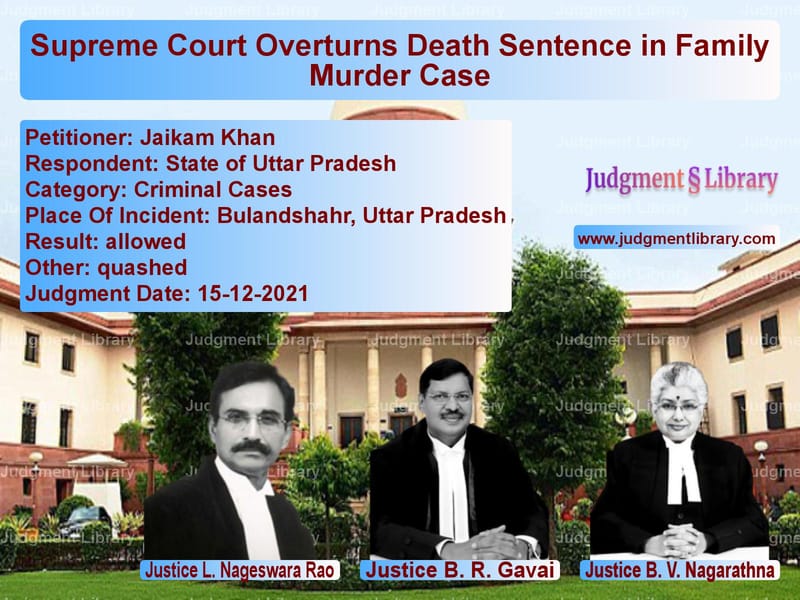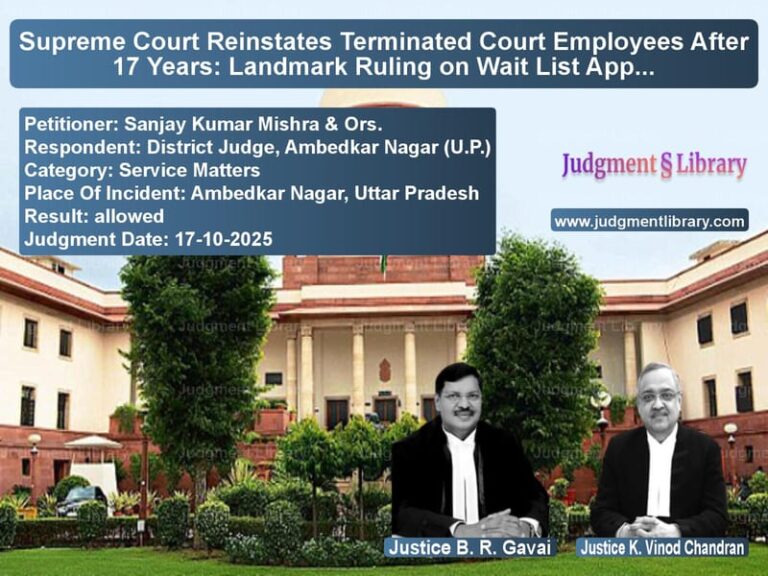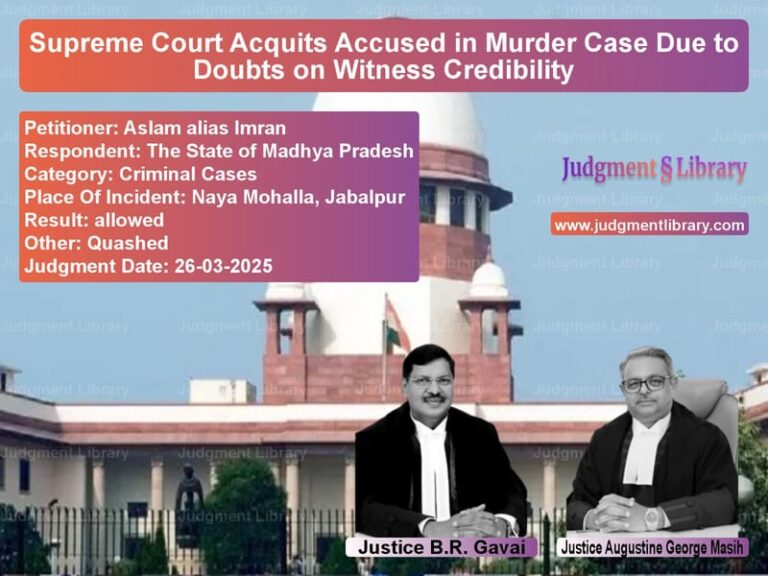Supreme Court Overturns Death Sentence in Family Murder Case
The Supreme Court recently delivered a crucial judgment in the case of Jaikam Khan vs. The State of Uttar Pradesh, where the Court overturned the death sentence imposed on three accused individuals. The case revolved around a brutal family murder incident in Bulandshahr, Uttar Pradesh, where six members of the same family were killed allegedly due to property disputes. The trial court and the High Court had both upheld the convictions and death sentences, but the Supreme Court found substantial inconsistencies in the prosecution’s case, leading to the acquittal of the accused.
Background of the Case
The case stemmed from a horrific crime that took place on January 23, 2014. The prosecution alleged that Momin Khan (Accused No.1), Jaikam Khan (Accused No.3), Sajid (Accused No.4), and Nazra (Accused No.2) conspired to murder multiple members of the same family due to a long-standing dispute over property and the operation of a brick kiln. The victims included the parents of Momin Khan, his brother, and other family members.
The case was based primarily on the eyewitness accounts of Ali Sher Khan (P.W.1) and Jaan Mohammad (P.W.2), who claimed to have witnessed the gruesome murders from hiding places within the house. However, the Supreme Court found their testimonies unreliable due to inconsistencies and lack of corroborative evidence.
Read also: https://judgmentlibrary.com/death-penalty-commuted-to-life-imprisonment-in-child-murder-case/
Prosecution’s Allegations
The prosecution claimed that:
- The accused attacked and killed six people using knives and other weapons.
- The murder was premeditated and stemmed from a dispute over property and the family brick kiln.
- The accused changed their bloodstained clothes after the murder, and these were later recovered by the police.
- The accused were arrested at Rajghat Chauraha shortly after the crime.
- Weapons used in the murder were recovered from locations pointed out by the accused.
Defense’s Arguments
The defense, led by Senior Advocate Smt. Nitya Ramakrishnan and others, argued that:
- The eyewitnesses, P.W.1 and P.W.2, had significant contradictions in their statements.
- The alleged recovery of weapons and clothes was fabricated, as they were found in an open area accessible to everyone.
- The accused were wrongly arrested, and their presence at Rajghat Chauraha was a concocted story.
- No independent witnesses, despite the presence of many villagers at the scene, were examined.
- The High Court acquitted Nazra based on the same testimony that was used to convict the other accused, raising doubts about the credibility of the prosecution’s case.
Supreme Court’s Judgment
The Supreme Court critically examined the evidence and found multiple discrepancies:
1. Unreliable Eyewitness Testimonies
The Court noted that P.W.1 and P.W.2 were closely related to the victims and the accused, making their testimony susceptible to bias. The Court stated:
“Their testimonies suffer from serious inconsistencies and contradictions. The crime occurred at multiple locations within the house, and it is highly improbable that both witnesses could have seen all the killings from their alleged hiding places.”
2. Contradictory Arrest and Recovery Stories
The Supreme Court questioned the credibility of the prosecution’s claims regarding the arrest of the accused:
- According to police records, the accused were arrested at 2:00 AM, yet P.W.2 testified that they were already present at the police station when he arrived to file the complaint.
- The recovered weapons were found in an open field, accessible to many people, making their evidentiary value dubious.
- Bloodstained clothes were allegedly recovered from the house of one of the accused, but no forensic evidence linked them to the crime.
3. Lack of Corroboration from Independent Witnesses
The Supreme Court highlighted that the prosecution failed to present independent witnesses, even though many villagers were present at the crime scene. The Court observed:
“The non-examination of independent witnesses, despite their availability, creates serious doubts about the veracity of the prosecution’s claims.”
4. Doubtful Motive
While the prosecution argued that a property dispute was the motive, the Court found that the alleged dispute had been settled years ago and there was no immediate provocation.
Key Takeaways from the Judgment
- Presumption of Innocence: The Court reaffirmed that the burden of proof lies on the prosecution, and any reasonable doubt must benefit the accused.
- Need for Reliable Evidence: The judgment stressed the importance of corroborated eyewitness testimony, especially in capital punishment cases.
- Flaws in Investigation: The Court criticized the investigation for fabricating evidence and failing to follow proper procedures.
- Death Sentence Should Be Awarded Cautiously: The Court emphasized that the death penalty requires clear, unimpeachable evidence, which was lacking in this case.
Final Verdict
The Supreme Court allowed the appeals of Momin Khan (Accused No.1), Jaikam Khan (Accused No.3), and Sajid (Accused No.4), overturning their convictions and directing their immediate release. The Court also dismissed the appeal filed by P.W.1 seeking the conviction of Nazra (Accused No.2), reaffirming her acquittal.
Conclusion
This landmark ruling underscores the judiciary’s commitment to upholding justice by ensuring that capital punishment is imposed only when there is absolute certainty of guilt. The judgment also highlights the importance of meticulous investigation and fair trials, especially in cases involving severe punishments.
Petitioner Name: Jaikam Khan.Respondent Name: State of Uttar Pradesh.Judgment By: Justice L. Nageswara Rao, Justice B. R. Gavai, Justice B. V. Nagarathna.Place Of Incident: Bulandshahr, Uttar Pradesh.Judgment Date: 15-12-2021.
Don’t miss out on the full details! Download the complete judgment in PDF format below and gain valuable insights instantly!
Download Judgment: jaikam-khan-vs-state-of-uttar-prade-supreme-court-of-india-judgment-dated-15-12-2021.pdf
Directly Download Judgment: Directly download this Judgment
See all petitions in Murder Cases
See all petitions in Bail and Anticipatory Bail
See all petitions in Judgment by L. Nageswara Rao
See all petitions in Judgment by B R Gavai
See all petitions in Judgment by B.V. Nagarathna
See all petitions in allowed
See all petitions in Quashed
See all petitions in supreme court of India judgments December 2021
See all petitions in 2021 judgments
See all posts in Criminal Cases Category
See all allowed petitions in Criminal Cases Category
See all Dismissed petitions in Criminal Cases Category
See all partially allowed petitions in Criminal Cases Category







